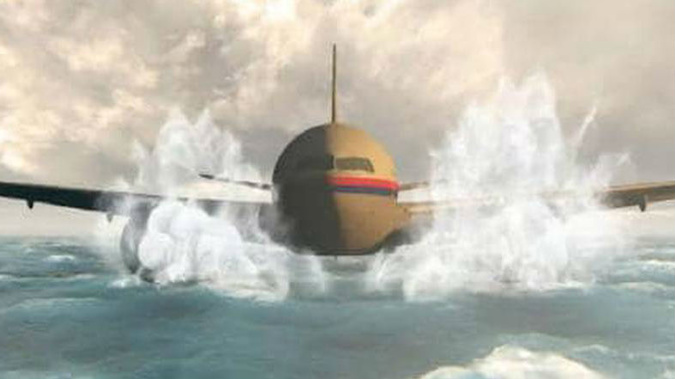
If you think you finally know the truth about what happened to MH370 after the latest 60 Minutes special on the missing plane, you are sorely mistaken.
While most aviation specialists agree that evidence points to the plane having been intentionally steered into the ocean, nobody has been able to come up with a motive.
READ MORE: Experts claim to have made chilling new MH370 discovery
Senior Boeing 777 pilot and instructor Simon Hardy believes Captain Zaharie Shah downed the aircraft in an act of murder-suicide, having plotted a flight plan to nowhere on his home simulator.
Repeating what he told the BBC way back in 2015, Hardy told the Channel 9 program that Zaharie made a detour over Penang for a nostalgic last look at his home town before ditching in the southern Indian Ocean in a spot where he knew the aircraft "could never be found".
The program was aired just days before the release of a new book MH370: Mystery Solved, written by aviator Larry Vance who also appeared on the 60 Minutes special.
Promotion leading up to the television special claimed its expert panel would reveal the "true fate" of the doomed aircraft, but there was plenty the programme didn't cover.
What was the motive?
What was missing from the commentary was a motive — what possible reason could Capt Zaharie have had to justify the murder of 238 other people?
Just days after the plane disappeared, Zaharie and his co-pilot Fariq Abdul Hamid, were named by the Malaysian authorities as prime suspects in the aircraft's disappearance.
From the very start, there were rumours that Zaharie's marriage was in trouble and that he had decided to down the plane in a fit of rage and grief after learning that she was about to leave him.
Another theory claimed that he hijacked his own plane in protest of the jailing of then-Malaysian opposition leader Anwar Ibrahim, and as a way to destabilise the corrupt government of Najib Razak.
Zaharie's sisters Sakinab Shah and Dah Ah have repeatedly denied both theories, claiming his marriage was going strong and arguing that he simply wasn't smart enough to evade "all the hi-tech satellites in the world".
Blaine Gibson, a US lawyer turned MH370 hunter who has collected dozens of pieces of suspected debris from the missing plane which have washed up in Madagascar and the coast of South Africa, pointed out in 2016 that both pilots were heavily scrutinised.
"They have gone under the microscope for more than two years and nothing in their personal lives indicates they could have done this," Gibson said.
Both pilots were cleared by Malaysian authorities, who examined psychological reports and footage of their behaviour before they boarded the doomed flight and found no red flags.
Former Malaysian dictator Mahathir Mohamad — who joined forces with his former arch nemesis Ibrahim to oust Razak in a stunning return to power last week — has publicly stated his belief that MH370 hijacked by remote control.
Even if it was true that Zaharie killed himself and 238 others in protest of Razak's treatment of Ibrahim, it seems unlikely that the new government would admit any significant association with him, given Mahathir's intention to make him his deputy.
Someone actually claimed responsibility
A shadowy group called the Chinese Martyrs' Brigade claimed responsibility for the disappearance of MH370 just days after the plane vanished — but officials were sceptical and said the claim could be a hoax.
The previously unheard of group sent an email to journalists across China that read: "You kill one of our clan, we will kill 100 of you as pay back."
But the message provided no details of what brought the flight down.
Malaysia's then-acting transport minister, Datuk Seri Hishammuddin Hussein, told reporters at Kuala Lumpur International Airport that he doubted the claim's legitimacy.
"There is no sound or credible grounds to justify their claims," he said, according to Malaysian news reports.
Other officials said the claim could be a hoax aimed at increasing ethnic tensions between Uighurs and Han Chinese in the wake of the recent knife attack in the southwestern city of Kunming on March 1, 2014, that left 29 people dead and injured about 140 others.
The message was delivered through an anonymous, encrypted Hushmail service that is virtually impossible to trace, authorities said.
In a strange twist, a Uighur painter named Memetjan Abdullah was aboard the plane on what was his first flight outside China.
At least two passengers had fake passports
Authorities scrutinising passengers on board MH370 found to their horror that at least two had been carrying fake identification.
According to investigators, the two men, both Iranians were travelling on forged and stolen passports in a bid to reach Europe and seek asylum there.
The men, who were identified as Pouria Nour Mohammad, 19, and Seyed Mohammed Rezar Delawar, 29 were friends, according to Malaysian officials.
Nour Mohammad had been using a stolen Austrian passport in an attempt to reach Germany to seek asylum and reunite with his mother, Malaysian police said. His mother was waiting for him in Frankfurt.
Delawar was believed to have been using a stolen Italian passport.
At the time, Malaysia's civil aviation chief Azharuddin Abdul Rahman said investigators were looking into the involvement of a stolen passport syndicate.
Police raided a travel agency in the Thai resort city of Pattaya where the two men travelling with the stolen passports bought their tickets to Europe via Beijing.
A manager at the Grand Horizon Travel agency told The Times that an Iranian contact known as "Mr Ali'', with whom the company had been doing business for three years, had asked her to buy Etihad and Qatar Airways flights for two customers.
The men were due to fly on March 1, 2014 but did not do so. When the tickets expired, Mr Ali asked her to book the cheapest flights to Europe — in this case, a Malaysian Airlines flight from Kuala Lumpur connecting through Beijing and on to Amsterdam.
Visa requirements have been eased in recent years for Iranian nationals travelling to Malaysia, making the country a popular hub for Iranian tourists, students, and those looking for ways to emigrate to Europe.
An unnamed Iranian, who met both passengers in Malaysia and went with them to the airport, told the BBC's Persian service in 2014 about the days before their departure.
"One of the two was my friend from high school," the friend said, apparently referring to Nour Mohammad.
"I met him the first day he arrived in Malaysia … He said he was staying for three to four days but was eventually going to Germany. His final destination was Frankfurt."
Very little was known about Delawar, other than that he was friends with the other Iranian. Despite this, authorities concluded it was unlikely that either man had terrorist links or had anything to do with the plane's disappearance.
Take your Radio, Podcasts and Music with you









